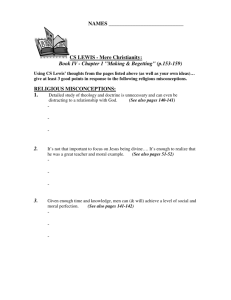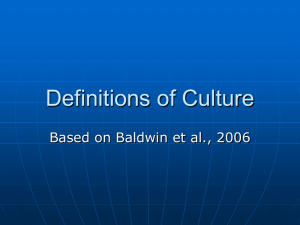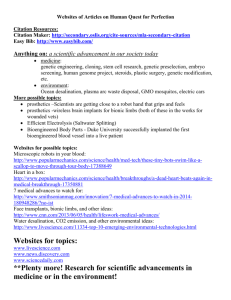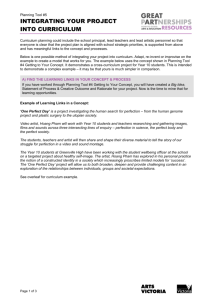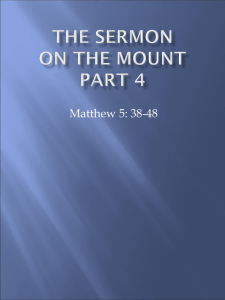06_Open Session - Portsmouth Cathedral
advertisement
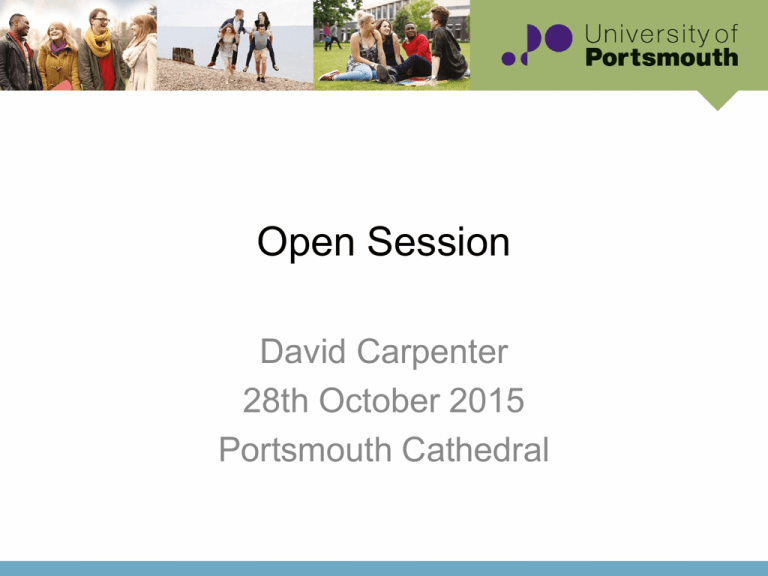
Open Session David Carpenter 28th October 2015 Portsmouth Cathedral 16 September 2015 Who is my neighbour 1? The so-called migrant problem. 23 September 2015 Who is my neighbour 2? World hunger, disease and other challenges faced by developing countries. 30 September 2015 The perfect person1. The moral landscape of new reproductive technologies 7 October 2015 The perfect person 2. Worthwhileness of life in the face of progressive disease and disability. Euthanasia- including assisted suicide. 14 October 2015 Law and order; crime and punishment. How can the scales of justice be balanced morally? 21 October 2015 Open session. It is likely that participants will identify further topics – this session will be devoted to some of these. Request 1 Can you talk through the concept of ‘the perfect person’? Both of the last two lectures were entitled ‘The Perfect Person…’ but I cannot remember how the concept was related to the main content of the talks. I have read through the powerpoint downloads on the Cathedral website but they do not cover the ground that concerns me. It seems to me that the ‘perfect’ person idea has been superceded, in the wake of modern scientific understandings, by the concept of ‘imperfect’ organisms – and that includes humans. As such it might be possible to ‘improve’ a person but not to ‘perfect’ in any but the most partial sense. I suspect that this offers an alternative basis for ethical considerations. Can you comment on this possibility? Request 2 Could we ask David Carpenter to explore the ethical issues relating to the conduct of business between countries where fundamental political and social differences exist? A topical example might be where the UK Government is seeking huge capital investments in this country by China. Another example might be on the subject of Overseas Aid. ………………..there were some very nice compliments after this Suggestion from last week • Medical Ethics • Case study Request 1 Can you talk through the concept of ‘the perfect person’? Both of the last two lectures were entitled ‘The Perfect Person…’ but I cannot remember how the concept was related to the main content of the talks. I have read through the powerpoint downloads on the Cathedral website but they do not cover the ground that concerns me. It seems to me that the ‘perfect’ person idea has been superceded, in the wake of modern scientific understandings, by the concept of ‘imperfect’ organisms – and that includes humans. As such it might be possible to ‘improve’ a person but not to ‘perfect’ in any but the most partial sense. I suspect that this offers an alternative basis for ethical considerations. Can you comment on this possibility? Perfection and Perfectibility 1 • Perfect organism -The perfect person1. The moral landscape of new reproductive technologies • Perfect death - The perfect person 2. Worthwhileness of life in the face of progressive disease and disability. Euthanasia- including assisted suicide. Perfection and Perfectibility 2 • Technical – perfecting talents and skills – Teleological perfectibility – Realising potentialities (where potentialities are seen as good and evil conceptualised as a failure) • Moral – Kant – we know what we ought to be – Utilitarians • Christian – Sinlessness – Reference to the example of Christ To assert that man is perfectible may mean either: • There is some task in which each and every man can perfect himself technically technical perfection • He is capable of wholly subordinating himself to God’s will obedientiary perfection • He can attain his natural end teleological perfection • He can make himself a being who is metaphysically perfect immaculate perfection • He can make himself a being who is harmonious and orderly aesthetic perfection • He can live in a manner of an ideally perfect human being moral perfection • He can become godlike exemplary perfection / deiform perfection Passmore, J. (1970) The Perfectibility of Man. London: Duckworth Request 2 Could we ask David Carpenter to explore the ethical issues relating to the conduct of business between countries where fundamental political and social differences exist? A topical example might be where the UK Government is seeking huge capital investments in this country by China. Another example might be on the subject of Overseas Aid. ………………..there were some very nice compliments after this Human Rights Principle 1: Businesses should support and respect the protection of internationally proclaimed human rights; and Principle 2: make sure that they are not complicit in human rights abuses. Labour Principle 3: Businesses should uphold the freedom of association and the effective recognition of the right to collective bargaining; Principle 4: the elimination of all forms of forced and compulsory labour; Principle 5: the effective abolition of child labour; and Principle 6: the elimination of discrimination in respect of employment and occupation. Environment Principle 7: Businesses should support a precautionary approach to environmental challenges; Principle 8: undertake initiatives to promote greater environmental responsibility; and Principle 9: encourage the development and diffusion of environmentally friendly technologies. Anti-Corruption Principle 10: Businesses should work against corruption in all its forms, including extortion and bribery. The extent of the arms embargo on China An arms embargo is a ban on the export of ‘arms and related material’ - ie military ammunition, weapons and goods - which may be imposed by a number of organisations, including the UN, the EU or the Organisation for Security and Co-operation in Europe. It may also be imposed at a national level. The UK interprets the scope of the China embargo as: •lethal weapons, such as machine guns, large calibre weapons, bombs, torpedoes, rockets and missiles •specially designed components of the above and ammunition •military aircraft and helicopters, vessels of war, armoured fighting vehicles and other such weapons platforms •any equipment which might be used for internal repression Civil Society Civil society is the "aggregate of non-governmental organizations and institutions that manifest interests and will of citizens."[1] Civil society includes the family and the private sphere, referred to as the "third sector" of society, distinct from government and business.[2] Dictionary.com's 21st Century Lexicon defines civil society as 1) the aggregate of non-governmental organizations and institutions that manifest interests and will of citizens or 2) individuals and organizations in a society which are independent of the government.[1] Sometimes the term civil society is used in the more general sense of "the elements such as freedom of speech, an independent judiciary, etc, that make up a democratic society" (Collins English Dictionary).[3] Especially in the discussions among thinkers of Eastern and Central Europe, civil society is seen also as a concept of civic values. One widely known representative of this concept is the Polish former dissident Adam Michnik. Volunteering is often considered a defining characteristic of the organizations that constitute civil society, which in turn are often called "NGOs", "NPOs", or CSOs. Most authorities have in mind the realm of public participation in voluntary associations, trade unions and the like,[4] but it is not necessary to belong to all of these to be a part of civil society. https://en.wikipedia.org/wiki/Civil_society Overseas Aid • Deontology – Kant • Utilitarianism – may have economic as well as moral ends • Rawlsian analysis • Nozickean response – justice in rectification Ethics and the NHS • The golden age of cures • The growth of treatment possibilities • The shift towards enhancement Moral Reasoning – Practical Ethics • • • • Deontology Consequentialism Virtue Ethics Principlism – – – – Beneficence Non-maleficence Justice Respect for autonomy • Global common good A Rough Framework Cure Choice Chance Enhancement Historical Position Cure Choice Chance Enhancement Historical Position Cure Strangely Comfortable • Much greater sense of the spiritual • Appeal of scepticism • Limited professional power • Virtue and compassion above professional knowledge and skill Choice Chance Enhancement Today Cure Strangely Disturbing Choice • Displacement of the spiritual • Impossible demands • Limitations of knowledge and skills • Compassion displaced by helplessness Chance Enhancement Cure Moral questions related to intention / motive / duty Enhancement Moral questions related to autonomy and liberty Choice Chance Sworn Oaths and Declarations Whatever, in connection with my professional practice, or not in connection with it, I see or hear, in the life of men, which ought not to be spoken of abroad, I will not divulge, as reckoning that all such should be kept secret. • About (in)action • A life of virtue • Possessing certain dispositions • About the actor not the act Gradual Shift –from swearing oaths • From actor to act • From being to (not)doing • From actions to principles Case Study M and D Ought I be doing this? D – a fairly ordinary case • • • • • • Nearly 84 Intelligent but under-educated Gout Diabetes Sciatica Limited mobility D’s Choices • • • • Openness No heroic treatment Die at home Lots of family involvement (actually quite demanding) Significant Deterioration • • • • Immobility Shaking Increased dependency Extremely hypotensive VSD – with severe pulmonary hypertension • • • • Should I have been told? What ought I to tell D? What ought I to tell M? What ought I to do – given D’s wishes? http://www.bbc.co.uk/ne ws/health-27887292 D deteriorates • • • • • Bed fast Incontinent Extreme postural hypotension Possible UTI He believes that he is dying Extreme delirium, confusion and aggression Diagnosis • Sepsis • MI • Cerebral bleed Ethical Considerations • Anticoagulation - ? exacerbated a cerebral bleed – duty of candour • CT Scan - ?good use of resources • What ought to be the goals of any treatment? • How much should I be told and how much should I tell M and D? Breaches of Confidence • What were they? • What role did my knowledge and status play? • Were the breaches unethical? • What would make a breach unethical?

